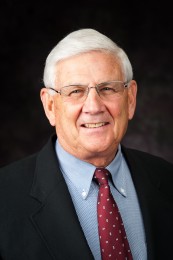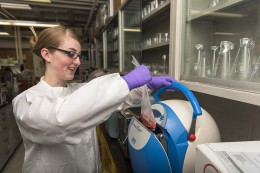By Anna Shippy
 Food, and the study of the science behind it, is a global field. Since the beginning of Kansas State University’s food science graduate program in 1965, students and alumni have been making an impact throughout the food industry — and the world.
Food, and the study of the science behind it, is a global field. Since the beginning of Kansas State University’s food science graduate program in 1965, students and alumni have been making an impact throughout the food industry — and the world.
From food chemistry, safety and processing, to nutrition, product development and business management, coursework in the program has grown to meet the demands of professionals in one of the world’s largest and most essential industries.
 Curtis Kastner, director of the K-State Food Science Institute since its inception 15 years ago, reflects on the impact of the university’s food science programs.
Curtis Kastner, director of the K-State Food Science Institute since its inception 15 years ago, reflects on the impact of the university’s food science programs.
What are the roots of food science at K-State?
Kastner: In 1965, the faculty who primarily focused on dairy foods processing got together to develop the beginnings of the food science graduate program at K-State. There was a need for an area of study that covered all commodities such as dairy, meat, poultry, etc. — and the food science program at K-State was the solution to meeting those needs.
How has the program grown over the past 50 years?
 Kastner: In 1972, the program expanded, and a food science undergraduate degree was formed. But the biggest growth in the program occurred since 2001 with the development of the Food Science Institute. From 2001 to today, we’ve had about a sevenfold total increase in all aspects of the program at K-State, including graduate and undergraduate students, as well as on-campus and online students. Now there are online bachelor’s and master’s degrees and certificates in more specific fields like food safety and defense.
Kastner: In 1972, the program expanded, and a food science undergraduate degree was formed. But the biggest growth in the program occurred since 2001 with the development of the Food Science Institute. From 2001 to today, we’ve had about a sevenfold total increase in all aspects of the program at K-State, including graduate and undergraduate students, as well as on-campus and online students. Now there are online bachelor’s and master’s degrees and certificates in more specific fields like food safety and defense.
How does food science education impact the workforce?
Kastner: On-the-job professionals have the opportunity to finish their bachelor’s and master’s degrees online, and we’re the only ones in the country who offer the degree asynchronously. The industry repeatedly comes back to us to have their employees involved in the program, and most companies pay for those students’ tuition and fees.
What’s your vision for the future of food science?
Kastner: Food science graduates are in demand, and in fact there are not enough qualified applicants to fill open positions within the industry. We want to continue to grow the program at a rate where we can still serve our students with quality, but get them into the workforce or into a higher position in the workforce to meet those global needs. The connection with the industry is a main reason our programs need to continue growing.
What has been most rewarding during your 15 years as director?
Kastner: When the institute was first developed, we were charged with increasing enrollment in the programs and also the visibility both in-house and nationally, and we’ve accomplished that. The program is now prominent in the country and is rated among the top 10 food science programs in the nation.
GET A TASTE FOR FOOD SCIENCE
Explore online bachelor’s, master’s and certificate programs in food science fields at global.k-state.edu/ag/food-science.